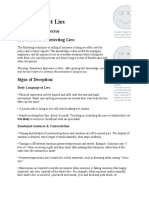Two Books On Nice Guy Syndrome
Two Books On Nice Guy Syndrome
Uploaded by
jamie vCopyright:
Available Formats
Two Books On Nice Guy Syndrome
Two Books On Nice Guy Syndrome
Uploaded by
jamie vOriginal Title
Copyright
Available Formats
Share this document
Did you find this document useful?
Is this content inappropriate?
Copyright:
Available Formats
Two Books On Nice Guy Syndrome
Two Books On Nice Guy Syndrome
Uploaded by
jamie vCopyright:
Available Formats
The Seattle Times: Mr.
Nice Guy
http://seattletimes.nwsource.com/cgi-bin/PrintStory.pl?document_id...
Tuesday, July 25, 2006 - 12:00 AM
Permission to reprint or copy this article or photo, other than personal use, must be obtained from
The Seattle Times. Call 206-464-3113 or e-mail resale@seattletimes.com with your request.
Mr. Nice Guy
By Diana Wurn
Special to The Seattle Times
"You're way too nice," is something Reid Busselle hears all
the time, but it is not always meant as a compliment.
STEVE RINGMAN / THE SEATTLE TIMES
James Rapson (left) and Craig
English co-authored "Anxious to
Please," about people who wrestle
with being overly nice. English
speaks from past experience, as the
guy who "wanted to be liked by
everyone, even grocery store clerks."
People say this to him after borrowing his work tools on the
construction site and then returning them damaged or not
returning them at all. His wife told him he was "too nice"
whenever he refused to argue with her. And he tells himself
the same thing when he thinks about advancing at work to
become a foreman. He could never imagine telling other people what to do, though he has spent a
lifetime gaining the skills and experience to do it. So he continues working as a sheetrock and metal
framer, which is taking a toll on his 48-year-old body.
"If you're too nice, you get a lot of people who take advantage of you," says Busselle, who lives in
Puyallup. "To avoid conflict, I'd even refuse to take something I bought back to a store if it was the
wrong size or if it was defective."
SURVEY
The extremely nice often find themselves stuck in middle-management jobs,
unfulfilling relationships and no idea why their niceness isn't reciprocated as
they think it should be. Though there are equal numbers of "overly nice" men
and women, it is men especially who find themselves frustrated by their
compulsive niceness and stuck because of it.
Busselle has spent a great deal of energy trying to make sure things go
smoothly, yet the paradox is that this very behavior actually creates
turbulence in his life.
An overly nice guy might insist on paying for absolutely everything,
apologize incessantly, compliment people with abandon and minimize his
own accomplishments while making sure everybody else feels worthwhile.
Nice guys hope that by doing these things, they will change others' behavior.
1 of 4
Mr. Nice Guy
How nice is too nice?
You eat the wrong
meal because you don't
want to send it back.
You go on a second
date with a woman who
ditched you on the first
date.
You lend a friend
rent money even though
he spent your last loan
on car speakers.
You have never used
your car's horn.
Vote
7/30/06 10:25 AM
The Seattle Times: Mr. Nice Guy
http://seattletimes.nwsource.com/cgi-bin/PrintStory.pl?document_id...
But real life is never so simple.
View Results
"It's confusing to people," says Timothy Keller, a 23-year-old music major at
the University of Washington, who picked up a copy of a friend's book called "Anxious to Please" and
immediately identified with the term "chronically nice."
He was constantly doing nice things for women he wanted to date, and trying to make sure they were
happy with questions like: "Do you want another beer? A glass of water? Are you hungry? Can I drive
you somewhere?"
"I actually think it came across as kind of creepy," says Keller.
People he met wondered why he had so much time to do so many things for them. And he noticed the
nice strategy didn't help him get work, either. In an important job interview, he remembers trying hard
to be everything the boss wanted. This also backfired.
Keller now realizes his acquiescent behavior made him seem less desirable and less real. "I'm sure the
boss picked up on that and thought: That's bull!" he says.
A self-destructive pattern
"Nice guys are fundamentally dishonest," says Dr. Robert Glover, a licensed marriage and family
therapist in Bellevue, and author of "No More Mr. Nice Guy!" one of two books on the subject by
local authors. The nice guy says what other people want to hear and hides their mistakes to avoid
conflict.
Glover has worked for years counseling men whose need to please has interfered with their work and
relationships. These men generally fear being the brutish jerk that people dislike. By being extremely
nice, they believe they're different and therefore better than the typical guy.
Men are also more reluctant than women to discuss the issue or identify it as a problem because of
societal conditioning. And it's a problem that has grown over the past few decades, says Glover, even
though it's rarely discussed openly.
A "covert contract" guides most chronically nice behavior, says Glover. It is the hope that niceness will
beget niceness, and they will be rewarded and liked by doing things for others, and never have to
demand anything for themselves.
But asking for what you want out of any kind of relationship is part of what makes it a healthy one, he
says. The extremely nice never seem to get what they want and beneath all the strained smiles, a
passive-aggressive rage can be slowly seething.
"In any kind of relationship they want to end, these men hope for what I call the Greyhound Divorce,"
says Glover, "They hope their partner will just get hit by a Greyhound bus or maybe get cancer rather
than taking action to change something."
2 of 4
7/30/06 10:25 AM
The Seattle Times: Mr. Nice Guy
http://seattletimes.nwsource.com/cgi-bin/PrintStory.pl?document_id...
They start to resent the other person for not fulfilling all their needs, but can't address it because it just
wouldn't seem nice.
He also mentions the other way that nice guys decide to ditch a relationship. Rather than telling another
person what they need or what isn't working, they opt for the "break-up by stripper" method. This
involves doing destructive things until the partner calls it off out of frustration.
Gaining perspective on behavior
Unlike a clinical diagnosis of something like generalized anxiety disorder, which occurs in only 5
percent of the population, and involves pronounced and distressing worry that makes it difficult to
function, "nice guys" can function normally in daily life.
It's just that they aren't truly happy. The compulsive desire to be nice to everyone is an overwhelming
and exhausting task.
"I wanted to be liked by everyone, even grocery store clerks," says Craig English, co-author with
James Rapson of the new book, "Anxious to Please."
Book signing
"Anxious to Please"
Authors James Rapson and Craig
English, 7 p.m. Wednesday, July 26,
Third Place Books, Lake Forest Park
Towne Centre, 17171 Bothell Way
N.E., 206-366-3333.
English was the guy who always stayed late at the office, usually
until 11 p.m., feeling unappreciated but hoping his efforts at work
would be noticed.
Someday.
He was the guy who for years could not write an e-mail without
saying "thank you" and complimenting the recipient at least once.
By simply being aware of his feelings, he was able to identify how
it felt to be "nice" versus genuinely kind. He started to stand up for himself at work and noticed that
when he was falling all over himself to appear nice, he was often just trying to get a certain reaction.
"A great question is to ask yourself is: Would it have been just as easy not to have done the nice thing?
If so, you have to ask yourself if you are trying to get someone to like you," says English.
The hardest part of changing behavior requires a nice guy to confront a core belief that he is not OK
just as he is without the $50 flower arrangement, or the extravagant meal on the first date or those
extra hours at the office on weekends.
Rapson and others counsel men on how to ask for what they want and accept that in any relationship
they also have needs. They help men focus on the reality of a situation and allow them to give up the
illusion of control. Soon nice guys are more focused on what is really happening than the fantasy of
what could happen.
Glover even suggests practicing more of the "nice" behavior as an experiment, just to see how it feels
to go completely overboard. After spending an entire weekend overly focused on everyone else's
3 of 4
7/30/06 10:25 AM
The Seattle Times: Mr. Nice Guy
http://seattletimes.nwsource.com/cgi-bin/PrintStory.pl?document_id...
needs, it quickly becomes apparent how annoying such servile behavior can be.
The key is reconnecting with other men, getting physically strong and healthy, finding healthy male
role models who can share their feelings and take risks, and re-examining the relationship with their
fathers, which is often lacking in some way, Glover says.
For Keller, the first step toward change was paying attention to his own behavior. He noticed
whenever he worried about what people thought of him, he'd lapse into his pleasing pattern. His
shoulders would tense and his stomach would become upset.
Once aware, he was able to change his behavior, and now says he's much happier. He has found
himself developing real relationships with a variety of people he never would have gotten to know in
the past.
"I used to try to 'nice' my way into people's affections," he says. "Now I've been able to substitute
doing nice things for actually fostering an emotional connection."
Diana Wurn is a frequent contributor to The Seattle Times; dianawurn@hotmail.com.
Copyright 2006 The Seattle Times Company
4 of 4
7/30/06 10:25 AM
You might also like
- Forbes Travel Guide Recommended VerbiageDocument5 pagesForbes Travel Guide Recommended VerbiageEmin100% (8)
- Bulletproof Confidence Checklist (James W. Williams) (Z-Library)Document33 pagesBulletproof Confidence Checklist (James W. Williams) (Z-Library)Garvey Milton100% (1)
- Marshmallow Skye (PDFDrive)Document160 pagesMarshmallow Skye (PDFDrive)Varnika Agarwal67% (3)
- The - MMXM - Trader - Entry - Thread - by - Themmxmtrader - Jan 4, 23 - From - RattibhaDocument4 pagesThe - MMXM - Trader - Entry - Thread - by - Themmxmtrader - Jan 4, 23 - From - Rattibhamecho satoNo ratings yet
- Andrew TateDocument2 pagesAndrew TateTavizNo ratings yet
- Driving Miss Daisy NotesDocument5 pagesDriving Miss Daisy Noteslizzy nicosonNo ratings yet
- Homebrew Content - Monster A Day CompendiumDocument115 pagesHomebrew Content - Monster A Day CompendiumRenato Alves97% (88)
- The Power Moves - Social Power Dynamics Overview Power DynamicDocument35 pagesThe Power Moves - Social Power Dynamics Overview Power DynamicdavidthembNo ratings yet
- The Art of Negotiation - Maria Ploumaki (Transcript)Document4 pagesThe Art of Negotiation - Maria Ploumaki (Transcript)Shreyans JainNo ratings yet
- New York State Athletic Commission: To Boxers and Managers Contemplating Entering Into Boxer-Manager ContractsDocument4 pagesNew York State Athletic Commission: To Boxers and Managers Contemplating Entering Into Boxer-Manager ContractskipNo ratings yet
- Now Discover Your Strengths Donald O. Clifton, Phd. & Marcus BuckinghamDocument7 pagesNow Discover Your Strengths Donald O. Clifton, Phd. & Marcus BuckinghamSanjeev Reddy KasulaNo ratings yet
- Module 3 - InventoryDocument12 pagesModule 3 - InventoryJehPoyNo ratings yet
- No More Mr. Nice GuyDocument5 pagesNo More Mr. Nice GuyYassine TaoussiNo ratings yet
- PDF - Social Circle & Life AuditDocument17 pagesPDF - Social Circle & Life AuditShalini JhaNo ratings yet
- 3 Signs of Toxic RelationshipDocument8 pages3 Signs of Toxic RelationshipMIRANo ratings yet
- How To Earn RespectDocument5 pagesHow To Earn RespectCharmaine AlipayoNo ratings yet
- Why Modern Dating Can Be So Hard - Mark MansonDocument62 pagesWhy Modern Dating Can Be So Hard - Mark MansonVovan Vovan0% (1)
- Why Get MarriedDocument20 pagesWhy Get MarriedaionicaNo ratings yet
- Seddit - WIKI: Core Materials:Inner Game - Part 7: Some Inspirational QuotesDocument4 pagesSeddit - WIKI: Core Materials:Inner Game - Part 7: Some Inspirational QuoteshugalfNo ratings yet
- The Way of The Superior ManDocument13 pagesThe Way of The Superior ManHarish G100% (2)
- 7 Personality Traits That Help You Look More AttractiveDocument3 pages7 Personality Traits That Help You Look More AttractiveasasNo ratings yet
- Script 33 - Becoming A High Value PersonDocument2 pagesScript 33 - Becoming A High Value PersonPrecious chuNo ratings yet
- How To Have WARRIOR LIKE SELF CONFIDENCEDocument10 pagesHow To Have WARRIOR LIKE SELF CONFIDENCEAris Nugraha SNo ratings yet
- 1.verbal Judo Beating Shame Attacks SJWs Amp Moral PoliceDocument10 pages1.verbal Judo Beating Shame Attacks SJWs Amp Moral PoliceRamiro BernalesNo ratings yet
- Alpha Male TraitsDocument2 pagesAlpha Male TraitstozinguedoNo ratings yet
- Learn Life by Joe LamptonDocument489 pagesLearn Life by Joe LamptonMartin VilchesNo ratings yet
- Andrew Tate Quotes From The Most Googled PersonDocument18 pagesAndrew Tate Quotes From The Most Googled Personilyass15.sodorNo ratings yet
- Love - The System (Synopsis)Document9 pagesLove - The System (Synopsis)Niko KraljNo ratings yet
- Women Secrets - Collective Wisdom of Past 5000 Years - VOL 1. The Unapologetic Truth About FEMALE NATURE (Telegram@TheGhostsTM)Document93 pagesWomen Secrets - Collective Wisdom of Past 5000 Years - VOL 1. The Unapologetic Truth About FEMALE NATURE (Telegram@TheGhostsTM)benamcke100% (1)
- The Dating Blueprint Unlocking Attraction and Building Lasting ConnectionsDocument28 pagesThe Dating Blueprint Unlocking Attraction and Building Lasting ConnectionsSsemwogerere FarmerNo ratings yet
- Day 1 PDF Magnetic Love Challenge v01Document1 pageDay 1 PDF Magnetic Love Challenge v01Antwon SpainNo ratings yet
- Amazing Things Will Happen: A Real-World Guide On Achieving Success & HappinessDocument8 pagesAmazing Things Will Happen: A Real-World Guide On Achieving Success & HappinessChandranath BoseNo ratings yet
- Alphamale Book BlueDocument43 pagesAlphamale Book BlueMiguel HernandezNo ratings yet
- Winner: Psychology of TheDocument57 pagesWinner: Psychology of ThemojopatchworksNo ratings yet
- How To Detect LiesDocument6 pagesHow To Detect LiesananntsharmaNo ratings yet
- PDF - Self Image TransformerDocument3 pagesPDF - Self Image Transformernaved.17549100% (1)
- Intro Attraction KingDocument4 pagesIntro Attraction KingFlominou12No ratings yet
- Confident GuyDocument148 pagesConfident Guykheper1No ratings yet
- 11 Incredible Psychological TricksDocument5 pages11 Incredible Psychological TricksmailsrinyNo ratings yet
- Mystery Method - The Easiest Way To Pick-UpDocument3 pagesMystery Method - The Easiest Way To Pick-UpMike LyonsNo ratings yet
- The Sixteen Commandments of PoonDocument6 pagesThe Sixteen Commandments of PoonJJ GarridoNo ratings yet
- Managing OneselfDocument3 pagesManaging OneselfKhushboo GargNo ratings yet
- What To Do When She Won't Join You SomewhereDocument15 pagesWhat To Do When She Won't Join You Somewherearan singhNo ratings yet
- No Soy Club ManifestoDocument19 pagesNo Soy Club ManifestoSmokey Grey100% (1)
- 2nd Commandment (10 Commandments of Game)Document4 pages2nd Commandment (10 Commandments of Game)Brandon Jenkin100% (1)
- M3 - Factors Influencing AttractionDocument18 pagesM3 - Factors Influencing AttractionBroNotes100% (1)
- The 20% of UMP That Is Gonna Bring 80% of Your Results (Part 1)Document10 pagesThe 20% of UMP That Is Gonna Bring 80% of Your Results (Part 1)Asparuh PavlovNo ratings yet
- Thou Shall Invite Her To Join Your AdventureDocument5 pagesThou Shall Invite Her To Join Your AdventureBrandon JenkinNo ratings yet
- Basic Elements of Difference Between A Successful Man and An Unsuccessful Man Are His: 1) Personality 2) Will Power 3) CommunicationDocument12 pagesBasic Elements of Difference Between A Successful Man and An Unsuccessful Man Are His: 1) Personality 2) Will Power 3) CommunicationreplyvaibhavNo ratings yet
- Ultimate Text GameDocument6 pagesUltimate Text Gamepkontaskis100% (1)
- Self AwarenessDocument19 pagesSelf AwarenessSARAH JOY L. VELANTENo ratings yet
- 5.the Covert Power Moves Amp How To Handle ThemDocument29 pages5.the Covert Power Moves Amp How To Handle ThemRamiro BernalesNo ratings yet
- Seduction 101Document4 pagesSeduction 101mudabber.musawerNo ratings yet
- The Secrets of Meeting, Attracting and Seducing Women - Right Now How To Meet and Seduce The Woman of Your Dreams (Peter Smith) (Z-Library)Document16 pagesThe Secrets of Meeting, Attracting and Seducing Women - Right Now How To Meet and Seduce The Woman of Your Dreams (Peter Smith) (Z-Library)陈旺峰No ratings yet
- Getting Over A BreakupDocument143 pagesGetting Over A BreakupChristopher Torres PalominoNo ratings yet
- 10 Fundamental Truths That Will Change Your LifeDocument3 pages10 Fundamental Truths That Will Change Your LifeRonald David Fisher100% (1)
- 50 Things Men Should KnowDocument4 pages50 Things Men Should KnowspadoddleNo ratings yet
- 1.psychology SecretsDocument32 pages1.psychology SecretsCsabi FinanceNo ratings yet
- The Power Moves - Start Here Power DynamicsDocument26 pagesThe Power Moves - Start Here Power DynamicsdavidthembNo ratings yet
- Make Your Guy Commit To Marrying You Without Efforts: From Casual Friendship To Committed Life Partners.From EverandMake Your Guy Commit To Marrying You Without Efforts: From Casual Friendship To Committed Life Partners.No ratings yet
- Discovering Dark Psychology: Mind Manipulation Trilogy: Exploring the Mysteries and Enigmas of Dark Psychology, #3From EverandDiscovering Dark Psychology: Mind Manipulation Trilogy: Exploring the Mysteries and Enigmas of Dark Psychology, #3No ratings yet
- What Women Want - 29 Things All Women Need In A RelationshipFrom EverandWhat Women Want - 29 Things All Women Need In A RelationshipRating: 1 out of 5 stars1/5 (1)
- 2016 Hybrid Job Skills InfographicDocument1 page2016 Hybrid Job Skills Infographicjamie vNo ratings yet
- Pancit Bihon Guisado Rice Sticks Noodles With VegetablesDocument3 pagesPancit Bihon Guisado Rice Sticks Noodles With Vegetablesjamie vNo ratings yet
- Tortang Carne Ground Beef OmeletDocument2 pagesTortang Carne Ground Beef Omeletjamie vNo ratings yet
- Pork Adobo With BeerDocument2 pagesPork Adobo With Beerjamie vNo ratings yet
- Pancit SotanghonDocument2 pagesPancit Sotanghonjamie vNo ratings yet
- Filipino Recipe Site - Com Chicken AdoboDocument2 pagesFilipino Recipe Site - Com Chicken Adobojamie vNo ratings yet
- Dealer Guide BrochureDocument48 pagesDealer Guide Brochurejamie vNo ratings yet
- Pancit PalabokDocument3 pagesPancit Palabokjamie vNo ratings yet
- Chicken Afritada Braised Chicken in Tomato SauceDocument3 pagesChicken Afritada Braised Chicken in Tomato Saucejamie vNo ratings yet
- Pioneer Institute - Social Emotional White PaperDocument44 pagesPioneer Institute - Social Emotional White Paperjamie vNo ratings yet
- Marriage Novena - HappyDocument28 pagesMarriage Novena - Happyjamie vNo ratings yet
- For Work: To Saint Josemaria Escriva Opus DeiDocument7 pagesFor Work: To Saint Josemaria Escriva Opus Deijamie vNo ratings yet
- Casio 3237Document3 pagesCasio 3237jamie vNo ratings yet
- 6 Negative Listening HabitsDocument1 page6 Negative Listening Habitsjamie vNo ratings yet
- Lt1 Chapter 11 Moving OutDocument16 pagesLt1 Chapter 11 Moving Outjamie vNo ratings yet
- Key 10 Principles of CST - 1 Pager PDFDocument1 pageKey 10 Principles of CST - 1 Pager PDFjamie vNo ratings yet
- USCCB Catholic Social TeachingDocument12 pagesUSCCB Catholic Social Teachingjamie v100% (2)
- Checklist With Key Provisions of The State Sanitary CodeDocument16 pagesChecklist With Key Provisions of The State Sanitary Codejamie vNo ratings yet
- Moleskine Pen Plus Quick User Guide EnglishDocument3 pagesMoleskine Pen Plus Quick User Guide Englishjamie vNo ratings yet
- Big-Picture Questions: Guide To Conducting A Culture and Needs Assessment (SWOT Analysis)Document2 pagesBig-Picture Questions: Guide To Conducting A Culture and Needs Assessment (SWOT Analysis)jamie vNo ratings yet
- Examen Prayer HandoutDocument12 pagesExamen Prayer Handoutjamie v100% (2)
- Medical I.I Center: Ankle AlphabetDocument2 pagesMedical I.I Center: Ankle Alphabetjamie vNo ratings yet
- Kaldereta Recipe - Filipino RecipeDocument1 pageKaldereta Recipe - Filipino Recipejamie vNo ratings yet
- Microsoft Project Quick Reference GuideDocument6 pagesMicrosoft Project Quick Reference Guidejamie v100% (2)
- Chopsuey Recipe - Filipino RecipesDocument1 pageChopsuey Recipe - Filipino Recipesjamie vNo ratings yet
- Manjra Charitable Trust's: Degree Board/ University Year of Passing PercentageDocument3 pagesManjra Charitable Trust's: Degree Board/ University Year of Passing PercentageGaurav BhatkarNo ratings yet
- Legislative Process in ParliamentDocument22 pagesLegislative Process in ParliamentJohn KoshyNo ratings yet
- Membangun Work-Life Balance Pada PNS Generasi Muda Di Lingkungan Badan Siber Dan Sandi NegaraDocument13 pagesMembangun Work-Life Balance Pada PNS Generasi Muda Di Lingkungan Badan Siber Dan Sandi NegaraSaras GusvitaNo ratings yet
- Guidelines For Writing A Literature ReviewDocument7 pagesGuidelines For Writing A Literature ReviewNinad SamelNo ratings yet
- Present Simple Revision Worksheet #4Document3 pagesPresent Simple Revision Worksheet #4Eugenia TotinhoNo ratings yet
- 1986 Deterioration MonumentsDocument34 pages1986 Deterioration MonumentsPradeep PatilNo ratings yet
- Dionysius Hierarchy of AngelsDocument3 pagesDionysius Hierarchy of Angelsberrybill100% (2)
- Processing of Persuasive In-Group MessagesDocument11 pagesProcessing of Persuasive In-Group MessagesJoyce TanNo ratings yet
- Modal auxiliaries past (tuyển)Document3 pagesModal auxiliaries past (tuyển)Diệu Anh HoàngNo ratings yet
- Twitter: Nurse077 - : Preparation / Abdulrahman Al-Gamdi 0533319252Document21 pagesTwitter: Nurse077 - : Preparation / Abdulrahman Al-Gamdi 0533319252troubleeshooting fileNo ratings yet
- Pid KidsDocument46 pagesPid KidsSamrandNo ratings yet
- 11g New FeaturesDocument27 pages11g New FeaturessureshmskNo ratings yet
- HWDocument6 pagesHWapi-248733530No ratings yet
- Assignment 1Document8 pagesAssignment 1dewangreeaadamNo ratings yet
- Musculoskeletal Medicine in The Usa Education and Training of Family PhysiciansDocument4 pagesMusculoskeletal Medicine in The Usa Education and Training of Family PhysiciansDavidBeatonComuladaNo ratings yet
- David T. Garret - Tupac AmaruDocument44 pagesDavid T. Garret - Tupac AmaruClaudia ArteagaNo ratings yet
- Elementary 3rd EditionDocument122 pagesElementary 3rd Editionlatyshovllad2011No ratings yet
- Selected Speeches of Mahatma GandhiDocument14 pagesSelected Speeches of Mahatma GandhiSrinivasa Gopalan Vedhantha DesikanNo ratings yet
- South Carolina Maternal Morbidity and Mortality Review CommitteeDocument4 pagesSouth Carolina Maternal Morbidity and Mortality Review CommitteeABC15 NewsNo ratings yet
- Elizabeth A Tucker ResumeDocument2 pagesElizabeth A Tucker Resumeapi-304687342No ratings yet
- 1 Answer Key A Grammar, Vocabulary, and PronunciationDocument6 pages1 Answer Key A Grammar, Vocabulary, and PronunciationtuizfagmtNo ratings yet
- OriflameDocument42 pagesOriflamemanuNo ratings yet
- Petitioner Vs Vs Respondents Platon Martinez Flores San Pedro & Leano and Padilla & Padilla Law O Ce Ismael M. GuroDocument6 pagesPetitioner Vs Vs Respondents Platon Martinez Flores San Pedro & Leano and Padilla & Padilla Law O Ce Ismael M. GuroSabNo ratings yet
- 1MRK502031-BEN A en Product Guide REG670 1.2 CustomizedDocument128 pages1MRK502031-BEN A en Product Guide REG670 1.2 CustomizedmarganoNo ratings yet
- Revesion QuideDocument250 pagesRevesion QuideSama Diares100% (1)
- International Folk Dance - IlgDocument54 pagesInternational Folk Dance - IlgIan Ace P. SantiagoNo ratings yet


















































































































